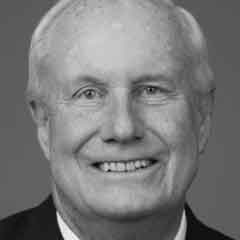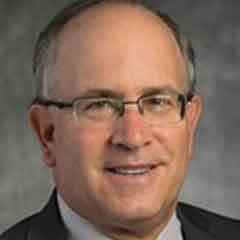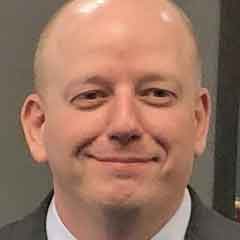




Hide/Show
11:00 a.m.–11:30 a.m. Central | Track: General | CRCE: 0.00
11:40 a.m.–12:00 p.m. Central | General | CRCE: 0.00
12:05 p.m.–12:55 p.m. Central | Track: Clinical Practice | CRCE: 0.00
Tiffany Christensen, CPXP
Show description

Tiffany Christensen is Vice President for Experience Excellence at The Beryl Institute. She is a rare individual who has worked beside respiratory therapists in her professional role and is also a life-long patient with cystic fibrosis and a lung transplant recipient. Join us for a conversation about the “lived experience” of the people respiratory therapists care for every day and the impact this makes on the most vulnerable moments of an individual’s life. Care for yourself while learning how to care for others in this story-based presentation.
1:00 p.m.–1:35 p.m. Central | Track: Adult Acute Care | CRCE: 0.58
PRO: Jaspal Singh, MD, MS, MHA
CON: Neil MacIntyre, MD
Show description


In some cases, COVID-19 can cause severe ARDS—but is COVID-19 ARDS distinct or does it differ from other forms of ARDS? Come to this session to hear two experts debate this controversial topic based on what has been learned during the pandemic.
1:00 p.m.–1:35 p.m. Central | Track: Neonatal/Pediatric | CRCE: 0.58
Alexandre Rotta, MD, FCCM
This session sponsored by:
Show description

Since the publication of the Pediatric Acute Lung Injury Consensus Conference in 2015, much has been learned regarding the ventilatory management of infants and children with PARDS. The presentation will provide recommendations on the optimal ventilatory management of those with PARDS based on the published literature.
1:00 p.m.–1:35 p.m. Central | Track: Clinical Practice | CRCE: 0.58
Tammy Stucki, MSRC, RRT, RRT-ACCS
This session sponsored by:
Show description

The COPD Home Monitoring for Early Symptom Recognition QA study will inform the learner about methods to improve their COPD Readmissions program. They will learn about the various technological devices used and pharmacological consults given to assist these patients in recognizing the early exacerbation symptoms.
1:00 p.m.–2:30 p.m. Central | Track: Clinical Practice | CRCE: 1.50
Supported by an unrestricted educational grant from
Show description
Researchers present the results of their work using PowerPoint, followed by questions from the attendees.
1:40 p.m.–2:15 p.m. Central | Track: Adult Acute Care | CRCE: 0.58
Michael Lipnick, MD
Show description

Profound hypoxemia has been a common finding in COVID-19 pneumonia. Early presentations described patients with severe arterial hypoxemia without tachypnea or apparent discomfort. These patients were also said to 'crash' quickly and require intubation and mechanical ventilation. The term happy hypoxic littered medical journals. The issue of silent hypoxia is a well-known physiologic phenomenon related to cardiorespiratory compensation and eventual failure of these mechanisms.
1:40 p.m.–2:15 p.m. Central | Track: Education | CRCE: 0.58
Stacy Blank, MS, BTPS, RRT
Show description

The COVID-19 public health emergency caused remarkable changes to the way hospitals across the United States operate. Not one department was unaffected, and many staff were redeployed to other areas of the hospital. This had a major impact on pulmonary rehab programs, with many patients being left without these valuable resources when they needed them most, as well as inconsistent care. These variabilities pose a direct threat to programs and participants, potentially leading to loss of trust, unnecessary hospitalizations, even increased mortality. This session will explore the challenges, dilemmas, and opportunities experienced by pulmonary rehab programs through service suspensions and re-openings during the pandemic, leading to the development of a potential standardized protocol that can be used to guide other programs and ensure pulmonary and cardiac rehab programs continue to function during future public health emergencies.
1:40 p.m.–2:15 p.m. Central | Track: Neonatal/Pediatric | CRCE: 0.58
Rob DiBlasi, RRT, RRT-NPS, FAARC
Show description

Surfactant replacement is a lifesaving therapy for pre-term infants. Liquid bolus administration via endotracheal tube has been the hallmark for surfactant administration. This lecture will discuss innovations using novel nebulizer technologies that may provide a potentially safer and more effective alternative for surfactant delivery in infants and larger children.
2:15 p.m.–2:45 p.m. Central | Track: General | CRCE: 0.00
2:50 p.m.–4:45 p.m. Central | Track: Adult Acute Care
2:50 p.m.–3:25 p.m. Central | CRCE: 0.58
Thomas Piraino, RRT, FAARC
Show description

The COVID-19 pandemic has made an impact in the world of mechanical ventilation, but does the presentation of the COVID-19 associated respiratory failure require a different strategy? This lecture will discuss some of the controversy surrounding COVID-19 mechanical ventilation practices and whether there is sufficient information regarding how to deliver mechanical ventilation.
3:30 p.m.–4:05 p.m. Central | CRCE: 0.58
Eddy Fan, MD, PhD
Show description

Many clinicians have described excessive respiratory drive in COVID-19 patients, but is this problematic? This lecture will discuss the impact of respiratory drive-in managing ARDS patients, and what can be done about it.
4:10 p.m.–4:45 p.m. Central | CRCE: 0.58
J. Filipe Damiani, PT, PhD
Show description

Extraordinary efforts to provide the best management in ARDS patients have been done during the COVID-19 pandemic. The use of some noninvasive respiratory support strategies remain widely controversial. This lecture will discuss the evidence of using noninvasive strategies to support patients with COVID-19 and how this knowledge has changed our current practice in ARDS.
2:50 p.m.–3:25 p.m. Central | Track: Management | CRCE: 0.58
Joel Brown, MSM-HCA, RRT, FAARC
Show description

The clinical fight against COVID-19 is debilitating to our patients and takes a toll on us as respiratory therapists. Maintaining the drive to return to work and care for our community over the last year and a half has been difficult. Statistically, more health care providers are leaving the professions they love. On the other hand, our communities need us more than ever. In this lecture, the presenter will provide the attendees with the knowledge and tools needed to survive these challenging times and live to fight another day.
2:50 p.m.–3:25 p.m. Central | Track: Neonatal/Pediatric | CRCE: 0.58
PRO: Ira Cheifetz, MD, FAARC
CON: Alexandre Rotta, MD, FCCM
Show description


Prone positioning has become a standard approach for adults with ARDS; however, data for pediatric ARDS (PARDS) is limited. In this interactive session, two international experts will debate the role of prone positioning for those with PARDS based on the available literature and key physiologic principles. Time will be allocated for open discussion with the audience.
3:30 p.m.–4:05 p.m. Central | Track: Management | CRCE: 0.58
Jacklyn Grimball, RRT, AE-C, FAARC
Show description

Medical mistrust can reduce the likelihood that a patient will take the COVID-19 vaccine. Preventing racial disparities in uptake of a COVID-19 vaccine will be important for helping to mitigate the disproportionate impacts of the virus for people of color and preventing widening racial health disparities going forward. Also discussed will also the historical context on how structural racism contributes to racial health inequities such as those highlighted by the COVID-19 pandemic and the role respiratory therapist can take to encourage the Black population to receive the COVID-19 vaccine.
3:30 p.m.–4:05 p.m. Central | Track: Neonatal/Pediatric | CRCE: 0.58
Andrew Miller, MSc, RRT, FAARC
This session sponsored by:
Show description

This lecture will discuss the use of advanced (high-frequency modalities, NAVA, and APRV) in pediatric critical care. The focus will be on what we have learned so far from clinical studies, animal models, and bench studies to apply these complex modes in the PICU.
3:30 p.m.–5:00 p.m. Central | Track: Clinical Practice | CRCE: 1.50
Supported by an unrestricted educational grant from
Show description
Researchers present the results of their work. Authors briefly present their findings and engage in an open discussion with the attendees.
4:10 p.m.–4:45 p.m. Central | Track: Diagnostics | CRCE: 0.58
Joyce Baker, RRT, RRT-NPS, AE-C
Show description

Implementing recommendations from national evidence-based guidelines enables RTs to provide care based on the best available evidence in the literature. Understanding the context with which recommendations are provided helps respiratory therapists operationalize change and educators effectively communicate the clinical need for the processes that are changing. This lecture will review 2020 Focused Updates to the Asthma Management Guidelines Expert Paned Working Group of the National Heart, Lung, and Blood Institute (NHLBI) and National Asthma Education and Prevention Program Coordinating Committee (NAEPPCC) and their impact to a respiratory therapist’s clinical practice across the continuum of care.
4:10 p.m.–4:45 p.m. Central | Track: Management | CRCE: 0.58
Carrie Winberg, RRT
Show description

A proposal was developed at the request of a Tele-Critical Care physician. The "need" for RTs was not fully appreciated by the executive leaders. With the COVID pandemic surging and staff extenders needed, the value of RTs in Tele-Health moved to the forefront. The presenter will share the "how to" in creating this valuable team as well as outcomes since its inception and implementation.
There are no sessions that match your display preferences.